ZEttzr tn t4t attar.
RUSSIA, FRANCE, AND GERMANY.
July 7th.
Sin—It has recently been affirmed by Prince Gortschakoff, and reiterated by Count Walewski, in his circular despatch to Germany, that the tendency in that country towards a state of hostility with France is in violation of those Treaties on which the existence of Germany depends. The Russian Minister declares that " the Germanic Confederation is a combination purely and exclusively defensive. It is on that condition that she participates in the international law of Europe."
It is worth while to examine what basis there may be for such a state- ment. It does not appear probable, at first sight, that the Confederation should be devoid of any portion of those sovereign rights which belong to a European power. And although the Federal Act contains many instances of restrictions imposed by the Confederation on itself, in the interest of the particular States, and again restrictions imposed on particular States, in the interest of the Confederation, yet it is hardly likely that any restriction on its sovereign rights, as to peace and war, should have been imposed by Eu- rope on the Confederation. In fact, the powers of the Confederation in such a case as that which has now arisen by the invasion of Austrian Italy are clearly defined by Articles 36 and 47 of the Final Act of 1820, the substance of winch two Articles is thus given by Wheaton (History of the Law of Na- tions), pp. 467-459. The Germanic Confederation has the right, as a collective body, to declare war, make peace, and contract alliances and negotiate treaties of every kind. Neverthe- less, according to the object of its institution, as declared in the 2d Article of the Federal Act, the Confederation can only exercise these rights for its own defence, for the maintenance of the internal security, of Germany, as well as the independ- ence and inviolability of each of the States of which it is composed."
"Art. 47. Where a confederated State finds itself menaced, or attacked in its possessions not included in the Confederation, the latter is not bound to adopt de- fensive measures, or to take any active part in the war, until the Diet has recog- nized in the permanent council, by a plurality of votes, the existence of a danger threatening the territory of the Confederation."
It is therefore plainly in the power of the Diet, recognizing the existenze of such a danger, to have recourse to hostile proceedings, if a non-German province be even menaced, not to say directly attacked.
There are such strong reasons of another kind why Germany should re- main quiet, that it is to be regretted that the French and Russian diplo- matists, bent as they are upon conciliation, should have attempted in this instance to throw doubts on an unquestionable right. In another point of view, it cannot be very re-assuring to Germany to be told, by France and Russia, that her political existence depends upon the Treaties of Vienna. What are France and Russia now doing with those Treaties ? What did Russia do with them in 1853 ? It would be perhaps wiser for these two Powers to point out to Germany some other basis for her existence as a political power.
[This is the best, because the most explicit and precise statement that we have seen on the same side. But our esteemed correspondent will perceive, on reperusing his own statement, that he actually proves the Germanic Confederation to hold its power of peace and war—which has not been gain- said—for defensive purposes alone—for defence of federal territory. Then as to the German interest in preserving the treaties of 1815, however they may have been reduced to raga. " Germany" only exists by force of the treaties to which the other Powers are parties. Were those treaties as avowedly abandoned as they are damaged in fact, the German Govern- ments could all form an entirely similar alliance ; but before they did so, they would all be released ; and would they all join ? Again i the al- liance would be very powerful; but the other Powers could ignore it—per- haps even set up another alliance contra.] Governor Seward, of New York, is now on a tour of observation through our manufacturing districts, the development of which, since his visit to this country a quarter of a century ago, strikes him, we believe, as most remarkable. Mr. Seward on Friday went through the Town Hall, and two of the most important manufacturing establishments of Leeds.—Leeds Mercury.


























 Previous page
Previous page